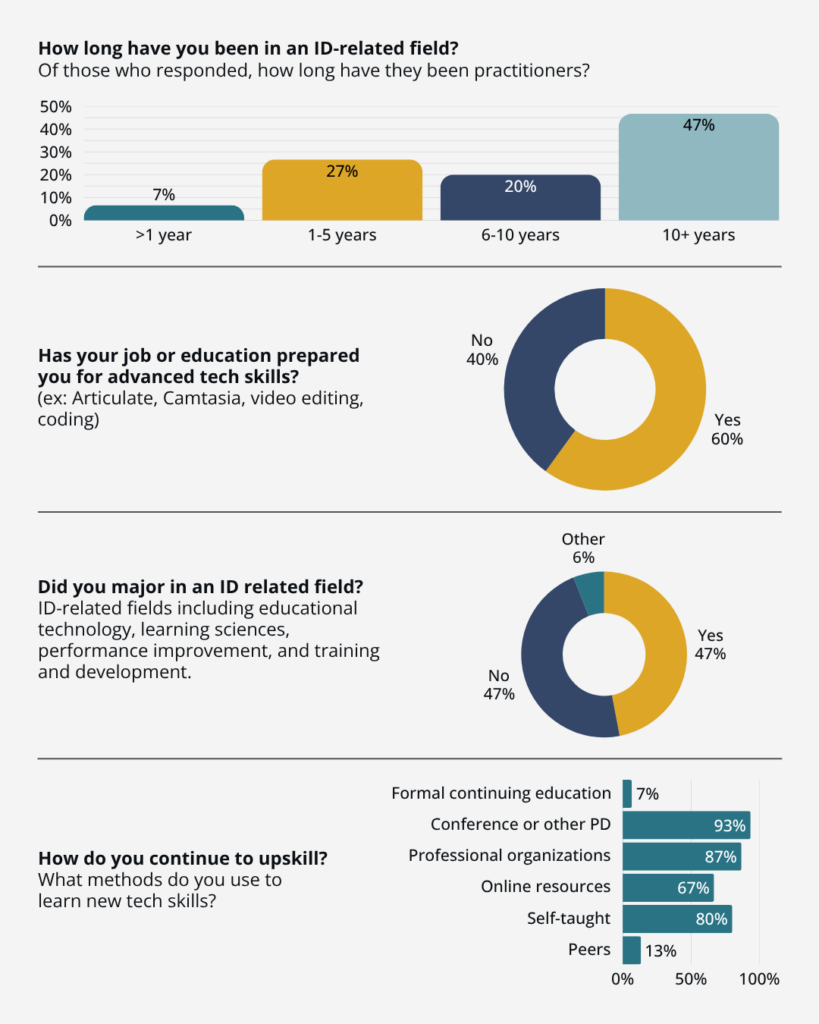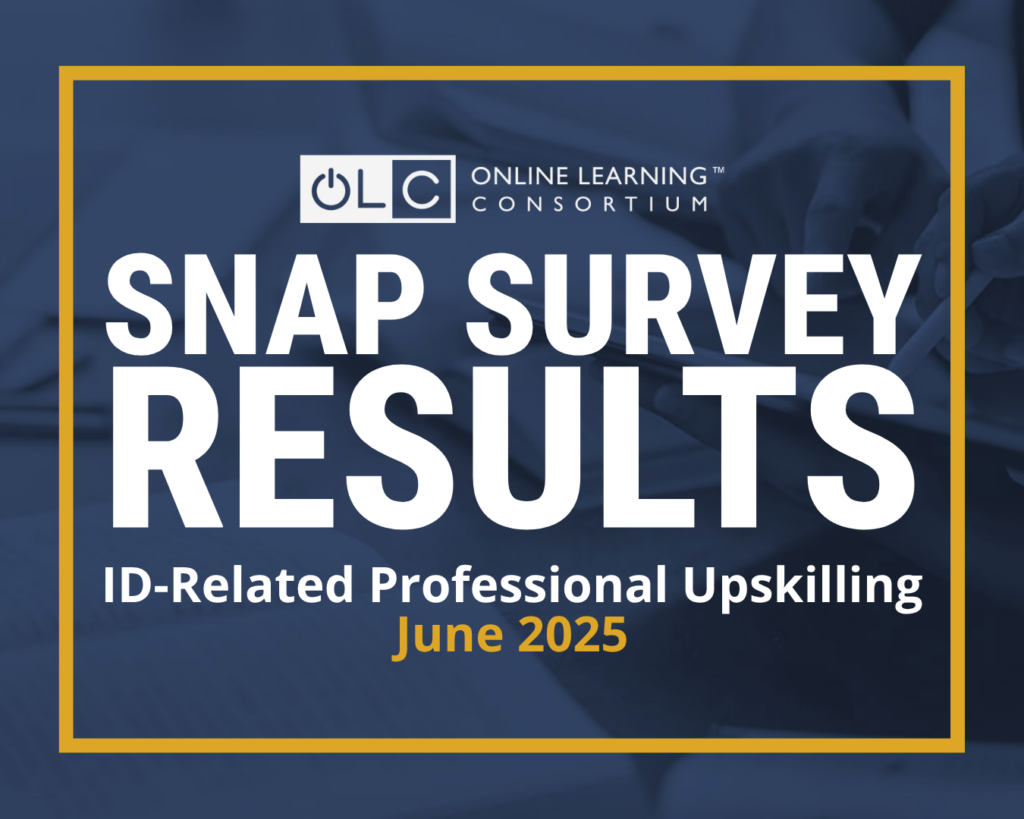
The Online Learning Consortium launched its monthly Snap Surveys in May 2025 as part of the OLC Today newsletter. These brief surveys aim to gather quick feedback on timely topics relevant to our member community. The results are intended to spark ideas, generate research questions, and inspire new projects.
The June Snap Survey was distributed to members on June 3, 2025, and remained open for three weeks. We received 15 responses to our four-question survey. While that is not a large enough sample to draw firm conclusions, we will address the trends suggested by the data.
We sincerely thank everyone who participated and shared their insights. Your feedback is invaluable to our ongoing research efforts. We look forward to continuing the Snap Surveys and engaging with our community through meaningful dialogue.
Anyone looking for an instructional design (ID)-related job in the last few years may have noticed an interesting trend in the job requirements. Technology skills such as: using Articulate Storyline (or Adobe Captivate); proficiency in learning management systems; understanding SCORM / xAPI standards; advanced video editing using Camtasia, Vyond, or Adobe Premiere Pro; Adobe Creative Cloud or other graphic design software; HTML/CSS and other basic web development; data analytics and learning analytics tools; along with advanced skills in Microsoft Office Suite, Google Workspace, and as many virtual classroom tools as possible are all in the top 10 required tech skills of the current job market.
So how do these professionals learn the necessary tech skills? Are they taught in formal programs? What about the professionals in these positions that did not attend formal programs – how did they learn their skills? And most importantly – how do current professionals in ID-related fields stay up-to-date or upskill themselves to prepare for changing technology, changing job requirements, or just changing jobs?
The results of our June 2025 Snap Survey presented in the graphic above (n=15) show the following trends in ID upskilling:
1. Diverse Experience Levels
Respondents span a wide range of experience—from newcomers to seasoned professionals. This suggests that the field is attracting both new talent and retaining experienced practitioners, which could indicate a healthy, evolving profession.
2. Varied Educational Backgrounds
Only a portion of respondents have formal education in instructional design or related fields. Others come from adjacent disciplines or have learned on the job. This reflects the interdisciplinary nature of ID and suggests that the field is accessible to professionals from diverse academic paths.
3. Mixed Preparedness for Advanced Tech Skills
Half of the respondents feel prepared for the technical demands of modern ID-related roles (e.g., eLearning tools, video editing, coding), while the other half do not. This gap highlights a potential mismatch between job market expectations and the training or experience many professionals in this area currently have. It could also signal the rapidly changing technology market that busy ID-related professionals struggle to keep up with as they balance current job responsibilities.
4. Upskilling is Broad and Self-Driven
Respondents use a wide variety of methods to continue learning:
- Conferences and professional development
- Online resources
- Peer learning and self-teaching
- Formal college or university continuing education (less common)
This shows that lifelong learning is a core part of ID-related professions, but also that support structures for upskilling may be informal or inconsistent.
The Bigger Picture
This data paints a picture of a dynamic and evolving field:
- Inclusive of diverse backgrounds
- Challenged by rapidly advancing technology
- Sustained by a strong culture of self-directed learning
It also suggests opportunities for institutions and organizations to better support IDs, or similar positions, through targeted training, mentorship, and clearer pathways for skill development. IDs and ID-related professions tend to be staffed by technology-curious professionals who are willing to dive in and teach themselves the skills they need to be successful. Institutions and organizations can assist their skill development by providing time and resources to develop their employees to match the current ed tech landscape and ever-evolving needs of the organization. How can we, as a community, build more structured pathways for upskilling and support the next generation of instructional design-related professionals?
 As senior researcher at OLC, Carrie designs, conducts and manages the portfolio of research projects that align with the mission, vision, and goals of the Online Learning Consortium. She brings with her over 15 years of experience as an online educator and instructional designer with a passion for research. She has peer-reviewed publications covering a variety of topics such as open educational resources, online course best practices, and game-based learning. In addition to a strong background in higher education teaching and instructional design, Carrie brings with her extensive experience in customer service and small business management. She holds a PhD in Educational Technology from Arizona State University, an MS in French from Minnesota State University, and BA in French from Arizona State University.
As senior researcher at OLC, Carrie designs, conducts and manages the portfolio of research projects that align with the mission, vision, and goals of the Online Learning Consortium. She brings with her over 15 years of experience as an online educator and instructional designer with a passion for research. She has peer-reviewed publications covering a variety of topics such as open educational resources, online course best practices, and game-based learning. In addition to a strong background in higher education teaching and instructional design, Carrie brings with her extensive experience in customer service and small business management. She holds a PhD in Educational Technology from Arizona State University, an MS in French from Minnesota State University, and BA in French from Arizona State University.





